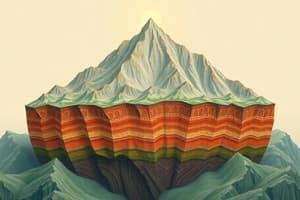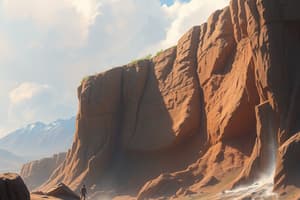Podcast
Questions and Answers
What is the main focus of stratigraphy?
What is the main focus of stratigraphy?
- Predicting volcanic eruptions
- Analyzing water movement
- Studying the history of Earth (correct)
- Investigating natural disasters
How do geologists use computational modeling in their research?
How do geologists use computational modeling in their research?
- To simulate geological processes like plate tectonics (correct)
- To analyze rock and mineral samples
- To predict tsunamis and earthquakes
- To study the movement of water on Earth
What is a key application of hydrology?
What is a key application of hydrology?
- Predicting volcanic eruptions
- Understanding the history of Earth
- Managing water resources (correct)
- Analyzing ancient atmospheres
How do geologists contribute to improved emergency preparedness?
How do geologists contribute to improved emergency preparedness?
Which technique do geologists use to understand the composition of rock and mineral samples?
Which technique do geologists use to understand the composition of rock and mineral samples?
What technology is NOT mentioned as being integrated into geological research for data interpretation?
What technology is NOT mentioned as being integrated into geological research for data interpretation?
What is the primary focus of geology as discussed in the text?
What is the primary focus of geology as discussed in the text?
Which journal maintains a CiteScore of Q1 in General Earth and Planetary Sciences?
Which journal maintains a CiteScore of Q1 in General Earth and Planetary Sciences?
What sets the journal Geology apart according to the text?
What sets the journal Geology apart according to the text?
Which topic falls under the subdisciplines of geology mentioned in the text?
Which topic falls under the subdisciplines of geology mentioned in the text?
What do geologists study regarding Earth's Formation according to the text?
What do geologists study regarding Earth's Formation according to the text?
What does 'Tectonics' mainly involve as discussed in the text?
What does 'Tectonics' mainly involve as discussed in the text?
Study Notes
Discovering Geology: A Broad and Fascinating Study
Geology is an interdisciplinary field that explores the Earth, its history, and the processes that shape our planet. It encompasses a vast array of topics, from the initial formation of the universe to the complex inner workings of our planet and its life-sustaining systems.
Geoscience Journals and Publications
Geosciences, a highly regarded international open-access journal, publishes research on geology, planetary science, and future Earth topics. It maintains a CiteScore of Q1 in the category of General Earth and Planetary Sciences and offers rapid publication, with a median time from first decision to publication of approximately 3 days. The journal Geology, also with a strong reputation, ranks as the #1 "geology" journal by Web of Science for 16 years in a row, and publishes timely, innovative, and provocative articles relevant to all fields of the geosciences.
The Scope of Geology
Geology is an expansive field that can be divided into numerous subdisciplines. Some of these topics include:
- Earth's Formation: Geologists study how the Earth formed and evolved, particularly the processes that led to the formation of the continental crust, such as the melting of mafic cumulates during the Archaean.
- Tectonics: The study of the forces and motions that shape the Earth's lithosphere, including the movement of continents, mountain building, and earthquakes.
- Stratigraphy: The study of rocks and the sequences in which they were formed, which helps to understand the history of our planet and the events that shaped it.
- Hydrology: The study of the movement, distribution, and quality of water on the Earth's surface and in its subsurface, with applications in water resources, hydropower, and environmental conservation.
Geology in Action
Geological research has significant real-world applications. For example, studies on earthquakes, tsunamis, and volcanic eruptions allow for better prediction of natural disasters and improved emergency preparedness. Investigations into the ancient Earth's atmosphere, oceans, and energy sources help us understand the conditions that fostered the origin and evolution of life.
Geological Methods and Techniques
Geologists employ a variety of methods and techniques in their research, including:
- Fieldwork: Geologists conduct field studies, collecting samples and measurements on Earth's surface, as on the ground or in remote sensing, to develop spatial models and infer geological processes.
- Laboratory Analyses: Geologists analyze rock and mineral samples in the laboratory, using techniques such as X-ray diffraction, electron microscopy, and geochemical analyses to understand their composition and origin.
- Computational Modeling: Geologists use computational models to simulate geological processes, such as plate tectonics, Earth's climate, and the formation of magma chambers.
The Future of Geology
Geology is a field that continues to advance, with new methods and techniques being developed to better understand our planet and its processes. Technologies such as remote sensing, machine learning, and artificial intelligence are being integrated into geological research, allowing for more efficient and accurate interpretation of geological data. The field of geology remains a dynamic and exciting one, with new discoveries and breakthroughs continually shaping our understanding of the Earth.
Studying That Suits You
Use AI to generate personalized quizzes and flashcards to suit your learning preferences.
Description
Delve into the diverse and captivating field of geology, spanning from Earth's formation to geological methods and the future of the discipline. Learn about tectonics, stratigraphy, hydrology, and the real-world applications of geological research.




